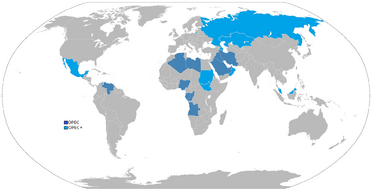More languages
More actions

The Organization of the Petroleum Exporting Countries (OPEC) is an international organization of 13 oil-producing countries. OPEC+ contains 11 additional countries, including the Russian Federation.
History[edit | edit source]
Abdullah Tariki of Saudi Arabia and Juan Pablo Pérez Alfonso of Venezuela established the Oil Consultative Commission and agreed to hold yearly meetings. After Exxon cut oil prices, the oil-producing countries met in Baghdad in September 1960 and founded OPEC. Its first resolution was to criticize the seven oil corporations and demand them to keep prices stable.
In October 1973, because of the Yom Kippur War, OPEC increased the price of oil, which rose from $3 to $36 by 1981.[1]
2020s[edit | edit source]
2022[edit | edit source]
In October 2022, against the wishes of the USA, OPEC announced it would reduce oil production by 2 million barrels (318 million liters) per day.[2]
2023[edit | edit source]
In July 2023, Saudi Arabia announced an oil production cut of approximately 1 million barrels per day,[3] which resulted in oil prices generally increasing until the autumn of 2023.
As of September 2023, oil prices approached but did not breach $100 per barrel, instead reaching a peak of $95 per barrel before falling.[4]
References[edit | edit source]
- ↑ Vijay Prashad (2008). The Darker Nations: A People's History of the Third World: 'Caracas' (pp. 183–8). [PDF] The New Press. ISBN 9781595583420 [LG]
- ↑ Prabhat Patnaik (2022-10-16). "The OPEC’s Decision to Cut Oil Output" Peoples Democracy. Archived from the original on 2022-10-14. Retrieved 2022-10-16.
- ↑ Maha El Dahan (2023-06-04). "Saudi plans new oil cuts as part of OPEC+ deal: sources" Reuters. Archived from the original on 2023-06-04. Retrieved 2023-10-07.
- ↑ Irina Slav (2023-09-30). "Saudi Arabia’s Oil Gamble Pays Off With $95 Brent" Oil Price. Archived from the original on 2023-10-06. Retrieved 2023-10-07.
